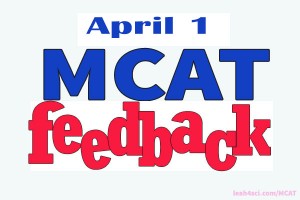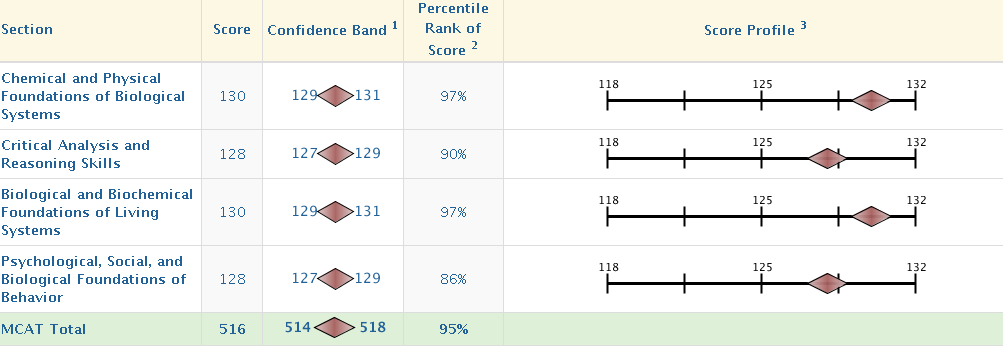 My goal as an MCAT tutor is to understand the MCAT as much as possible. For this reason, I interview students after every test date to understand how they felt, what helped them prepare, the nature of the exam, and so much more.
My goal as an MCAT tutor is to understand the MCAT as much as possible. For this reason, I interview students after every test date to understand how they felt, what helped them prepare, the nature of the exam, and so much more.
Overall feedback on this exam is very similar to what I published regarding the January 2016 exams.
One of my interviewee students tried a little bit of everything with great success. Here's what she had to say.
Which Resources Did You Use to Prepare?
Exams Taken:
- AAMC scored and Unscored
- Kaplan – 3 exams included with book purchase
- TPR Free exam (The Princeton Review)
- Next Step Free exam
- EK (ExamKrackers)
I know, I know, your next question is ‘how did she score on them?’
Here’s the thing, every company has a different scoring system so it’s hard to create a proper ‘trend’ when testing in multiple formats.
Keeping this in mind, her scores showed a general trend of improvement per section, and ranged from 498 (first exam, Kaplan) to 517 (final exam, AAMC scored)
Practice Exam Feedback
I was particularly interested to hear her feedback having worked through exams from so many different companies. Her analysis was unexpected but potentially even more helpful as a result.
“It’s not so much about the SPECIFIC exam you take, especially in the beginning. Instead it’s more about the fact that you’re TAKING the exams, that you’re learning about yourself and the ability to test. If this means you need to DIY your exam source, like taking the free demo offered by various companies, getting a few exams included with your book purchases… that’s fine, especially in the beginning.
I liked the Examkrackers exams best of all. I felt their passages most represent the length and specificity of the real MCAT, however some of their discretes were ridiculous and I don’t like that they don’t give you a proper score.
I personally liked Next Step free exam less than Examkrackers, but they have many more exams, and they’re cheap. Their questions were appropriately difficult and their scoring was fair, but there were typos in the passages that annoyed me.
I really like their presentation of questions for review showing you how you compared to other students testing and how they rank their easy/medium/difficult exams.
The Princeton Review demo exam felt hard, but when is testing ever fun?
Kaplan was… hard. Though, I did like their bio/biochem section. For psych/soc I felt that you can only do well if you read their books. I feel like every company did that, testing you on the material they teach in their own books.
And hey, since you get 3 free exams with their books, may as well use them for practice early on.
As you get closer to your test date you want to ensure you’re working through the RIGHT resources. That’s when you work on the material that is closest to the actual MCAT to help you better prepare.
This of course refers to the AAMC’s own material.”
All of the students interviewed after the April 1 exam agree that no company practice exams are exactly like the real thing, not even the AAMC’s own materials.
However, they rank the exams as follows:
- AAMC scored exam is closest to the real thing and mostly on par with the actual MCAT
- AAMC unscored (sample test) is close to the actual MCAT format but shorter and easier by comparison
- Next Step and Examkrackers have the most realistic practice exams.
Next Step has more exams for a lower price (discount on the MCAT resources) and Examkrackers offers fewer exams at a much greater cost.
Additional Resources Used:
- Kaplan MCAT Prep Books (includes 3 FL exams)
- Examkrackers MCAT Prep Books
- AAMC practice material (listed on the MCAT Resources Page)
- Leah4sci resources
- Khan Academy Videos
“Since you’re able to purchase individual books, I would recommend mixing and matching resources. For example, Kaplan was really good for some topics, but felt really dense for other questions. I like how they focused on a lot of important details but I tend to glance over them and would miss them. I also felt that the end of chapter questions were… awful.
Examkrackers is not as detailed but also not as intimidating because their questions are not as convoluted.
I recommend supplementing EK books with Kaplan as follows:
Physics – Kaplan is great for content review. Be wary of their end-of-chapter questions. There’s no way you need a 15-min + calculator practice question to learn this material.
General Chemistry – Kaplan is great for content review. Be wary of their end-of-chapter questions.
Organic Chemistry – I felt Examkrackers was good enough for this. With Orgo, it’s more about the foundation concepts. Focus on understanding what/why it is happening in the reaction rather than focusing on the advanced mechanisms. As in, don’t worry about Gabriel Amine Synthesis or Stryker’s reagent.
Biochemistry – There was a LOT of biochemistry on the last exam. I felt Examkrackers was good but missing a LOT of information. Kaplan did cover much more but because it was dense it was easy to skim over the little details.
If you’re the type of student who doesn’t skip a page before mastering it all then the Kaplan book is for you.
Even with all this, the section bank is your clue to what you still need to go back and master. If the books don’t cover it, find a resource that does and MASTER IT.
Leah’s Note: If it shows up in AAMC practice material it’s fair game for the actual MCAT
Biology – For this one I HIGHLY recommend the Examkrackers book because they do a very good job of connecting the different concepts together without requiring knowledge of the gen-chem or physics books for example. And since the AAMC is moving towards integrated biological science questions it’s even more important to truly understand the big picture of how everything works together. Examkrackers does that for you.
CARS – DO LOTS OF PRACTICE Wherever you can get the passages
Leah’s note: I recommend doing 2-3 passages every few days and always analyzing your approach to get better and better over the long term.
Psychology/Sociology This was the trickiest section to prepare for. Every test-prep company has their own spin on what to include, and even WITH using Kaplan, Examkrackers AND the Princeton Review I still felt some topics were missing.
I almost recommend getting an AP psychology or AP sociology textbook and studying from there.
Point is, you’ll have to supplement your book with other resources. Khan Academy is also great for filling in the gaps.
With all that, it was still a very rough section for me on the exam”
Leah’s Note: MCAT Books can be both boring and overwhelming. When you see black words on a white page it’s easy to get confused or glance over important details. I recommend supplementing your reading with videos whenever possible. Let the video TEACH you the information then simply review the books to VERIFY that you’ve mastered the material. More on this in the 5-step approach to mastering MCAT Sciences
How Did You Feel about the AAMC Section Bank?
“The section bank was very difficult, maybe even harder than the exam itself. The length was about the same but the conceptual and experimental information was more difficult. More pathways and concepts that required quick jotting down of concepts to answer more efficiently.
I didn’t take these timed because there’s no way I’d have been able to get through them fast enough.
I did finish the exam sections in time so I feel these were intentionally longer to give you more in-depth practice?
Looking back, I wish I gave myself more than just 2 weeks to review these passages. Perhaps even starting with these as my initial practice so that I’d have time to refresh and redo all the passages as I got closer to my exam.”
Leah’s Note: I recommend working through the AAMC material in phase 2 and reviewing them all again in phase 3. This allows you to properly balance your time without burning through these valuable resources before you’re ready.
Practicing Science and CARS Passages
The AAMC packets and bundles are absolutely closest to the real MCAT in style and nature, if not perhaps a little bit more difficult. Definitely give yourself enough time to review all of these passages, but not under pressure. I recommend reserving the AAMC passages for phase 2 of your MCAT prep so that you can comfortably work through 2-3 passages per day and learn from every passage and related question.
Which did you use for additional passage practice and how did you feel about them?
“I used Examkracker and the Princeton Review for practice passages, but honestly I don’t think it matters WHAT you use. The goal of passage practice is just that, passage practice.
It’s not so much about WHICH passages you practice early on, but rather about the fact that you’re doing passage practice. Passages helped me understand about my own learning style and required approach to the material. Many of the MCAT prep books have dozens of passages to practice. Having so many available allows you to experiment with the different techniques taught by the various test prep companies. Especially for something like CARS which is not based on content. It’s about teaching yourself what methods work for you. I’ve seen some of my friends dramatically increase their score by using a method that doesn’t work for others…”
Leah’s note: Never accept or dismiss a technique without REALLY trying it first. Give yourself a decent sample size of passages to practice before you determine if this approach does/doesn’t work for you.
Is There Anything You Wish You’d done Differently in Preparation for your MCAT?
“I think you’ll always wish you did things differently, studied longer and harder.
I do wish that I gave myself more time to prepare. I wish I would have been more diligent about reading through my book collection, perhaps 4-5 times to really get it.
I was constantly caught off guard by the little things that I should have known but didn’t remember. I know I’ve read the information but missed it when I read the chapter, it just didn’t feel… important. I think reading again would have helped me catch more and more details.”
Do you have any last minute advice for students about to test?
“Get a good night’s sleep before your exam. Don’t wait till the last minute, try to establish a routine at least a week before, especially if you’re used to staying up late to study. (Follow THIS STRATEGY to help fix your MCAT bedtime routine)
It’s very important to be IN THE ZONE on test day.
Unless you’re the social type who HAS to talk to others, I recommend not talking to anyone at the testing center. I sat in the corner eating a snack but overheard others talking about the exam and it got into my headspace. I feel like it was a distraction so I recommend avoiding it.
Oh, and don’t eat too much so you’re not always going to the restroom. You lose quite a few minutes getting fingerprinted on the way in and out.”
Keep in mind, this is the advice from one fellow Pre-med student who just took the MCAT. This is NOT a step by step guide for YOUR MCAT prep. Use this as a means to understand what is possible, study all the success stories and use it to craft YOUR OWN success story.
- Don’t lock yourself into a single prep source. Mix and match so that you’re utilizing the best resource for each individual aspect of your preparations.
- Use the AAMC material when you’re ready to begin regular passage practice. Give yourself enough time to complete the passages TWICE!
- Learn and improve from every practice source including questions, passages, and full length exams.
May 3 Update: 516!
“I am crying and shaking right now, but I feel great!!
This month was HELL waiting for the score to come out, and its good to travel and do things to get your mind off of it. Regardless of gut feeling after the exam, I think the scored FL is a very good indicator of your real score and to save it for one or two weeks before the exam day”

I’d love to hear your thoughts on this interview and on your MCAT preparation in the comments section below.
I earn a small commission if you purchase through my Amazon referral links. However, I only ever recommend the best resources because at the end of the day, my job as a tutor is to help YOU succeed.


